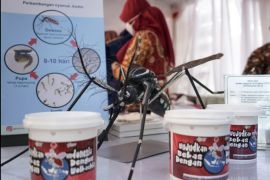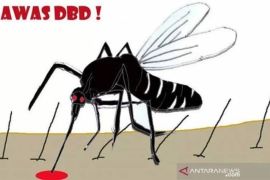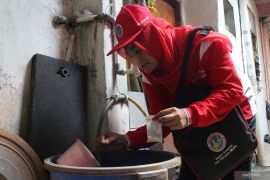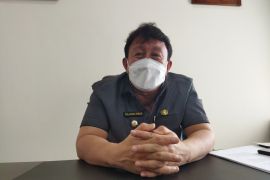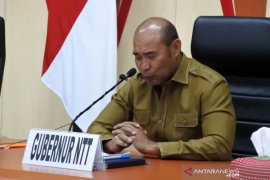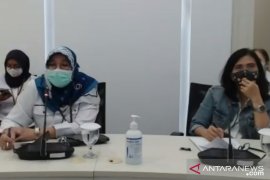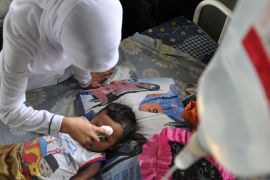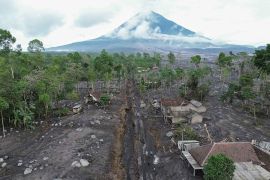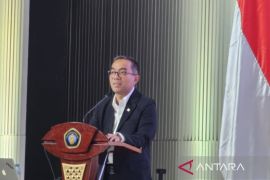The outbreak of the disease, characterized by a sudden onset of headache, racking joint pain, and a rash, will undeniably continue to hit parts of the country, unless the people start to clean up the breeding grounds of mosquitoes that carry the dengue virus.
People must anticipate a possible outbreak of the disease by improving the cleanliness of their environment and destroying the breeding grounds of the Aedes aegypti mosquito.
Dengue cases in Indonesia, a tropical country with a fast growing population, increase from time to time as a major killer, and therefore, people in various provinces have been warned to remain vigilant.
In the province of East Java, the Health Office of Tulungagung Regency sporadically carried out fogging in a number of areas to control the spread of this infectious disease.
The head of the Tulungangung District Health Office for the Prevention and Control of Infectious Diseases (P2PL), Didik Eka, remarked that the fumigation had been carried out in areas prone to dengue fever to break the chain of transmission.
In addition to fogging and eradicating mosquito breeding areas, Eka noted that the community was also encouraged to plant a certain type of plant whose aroma is not favored by mosquitoes.
The use of mosquito coils and electric mosquito repellents can prevent the dengue-carrying mosquitoes.
In 2018, cases of dengue fever in Tulungagung District increased from the previous year.
According to data from the Tulungagung Health Office, up to September this year, a total of 23 dengue cases were recorded, with a total of four deaths, whereas in 2017, there were 200 cases and three deaths in the district.
While in West Sumatra Province, the Pariaman city government found 54 cases of dengue fever in the area in the period of January to September 2018, but luckily there were no fatalities.
Rio Arisandi, the head of the Division of Disease Prevention and Control at the Pariaman City Health Office, remarked that in order to reduce the spread of dengue fever, Pariaman District Government continues to provide awareness to the public about the efforts to prevent the disease.
In addition, Pariaman District Government, through related agencies, also conducted fogging around community settlements, including giving Abate powder.
However, he added that the eradication of mosquitoes needed public awareness, such as monitoring mosquito larvae in the bathtub and water channels regularly.
Furthermore, the Pekanbaru City Health Office in Riau Province reported that 260 local residents had contracted dengue hemorrhagic fever (DHF) in the period from January to the end of September 2018, but none of them was reported to have died of the disease.
Acting Chief of Pekanbaru City Health Office, Zaini Rizaldy, explained in Pekanbaru that the increase in dengue cases is closely related to the weather condition of dry season, interspersed with occasional rain, and an unclean environment.
According to Rizaldy, the behavior of people who are lethargic in maintaining environmental hygiene has also added to the number of dengue cases in 12 sub-districts in Pekanbaru, especially in Tampan, which is densely populated.
A total of 260 cases of dengue were found to spread in 12 sub-districts in Pekanbaru, with the highest in Tampan sub-district, with 43 cases.
Although the government has urged people in various provinces to be wary of dengue fever, the number of cases continues to soar in several Indonesian regions.
Dengue cases in Indonesia, a tropical country with a fast-growing population, increase from time to time, in spite of the struggle to win the battle against the disease during the rainy season.
Since January to October 2018, dengue cases were reported to have occurred in numerous provinces, including East Java, West Sumatra, Riau, and North Sumatra.
Dengue fever in Langkat District, North Sumatra Province, continued to increase to reach 268 cases in September 2018.
The head of the Disease Eradication Section of the Langkat Health Office, Bendamuli, has said that dengue cases were reported in almost all sub-districts in Langkat.
In order to break the chain of dengue transmission, the local community had been called on to revive the tradition of mutual assistance by conducting an environmental cleanliness movement, such as burying, draining, and hoarding (3-M), in addition to eradicating the Aedes Aegypti mosquito`s breeding grounds.
Through the environmental cleanliness movement and the eradication of mosquito breeding grounds, the chain of the deadly disease can be broken.
Dengue is a mosquito-borne viral disease that has become so common among humans that it has, in recent years, turned into a major international public health concern.
This acute infectious disease was first detected in 1968 in Surabaya, East Java; and Jakarta when more than 50 cases were found at the time and more than half of the victims had died of such an ailment.
(O001/INE/O001)
EDITED BY INE
(T.O001/A/KR-BSR/O001) 20-10-2018 21:05:00
Reporter: Otniel Tamindael
Editor: Suharto
Copyright © ANTARA 2018
